|
|
 |
Fiche d'espèce de Copépode |
|
|
Cyclopoida ( Ordre ) |
|
|
|
Oncaeidae ( Famille ) |
|
|
|
Triconia ( Genre ) |
|
|
| |
Triconia elongata Böttger-Schnack, 1999 (F,M) | |
| | | | | | | Syn.: | "Oncaea dentipes form B" (Males, non females): Böttger-Schnack, 1996. | | | | Ref.: | | | Böttger-Schnack, 1999 (p.43, 97, figs.F,M); Böttger-Schnack & al., 2001 (p.1029, tab.1, 2); Böttger-Schnack & al., 2004 (p.1130, tab.1, Rem.); Böttger-Schnack & Machida, 2011 (p.111, Table 1, 2, fig.2, 3, DNA sequences, phylogeny); Wi & al., 2012 (p.852: Table 1; p.853: Table 1, 2); Cho & al., 2013 (p.18, figs.F, Descr. variant form) | 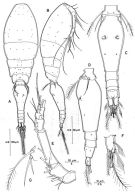 issued from : R. Böttger-Schnack in Mitt. hamb. zool. Mus. Inst., 1999, 96 [p.98, Fig.27]. Female (from Red Sea): A, habitus (dorsal); B, idem (lateral right side); C, urosome (dorsal); D, idem (lateral right side); E, A1; F, caudal ramus (dorsal, long terminal setae omitted); G, P5 (dorsal). Nota: Proportional lengths (%) of urosomites and caudal rami 8.9:54.6:8.6:7.9:11.7:8.6. Relative lengths (%) of segments of A1 measured along posterior non-setigerous margin 7.1:19.1:46.2:12.9:4.0:10.7.
|
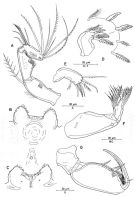 issued from : R. Böttger-Schnack in Mitt. hamb. zool. Mus. Inst., 1999, 96 [p.99, Fig.28]. Female: A, A2 (anterior); B, labrum (anterior); C, idem (posterior); D, Md (showing individual elements); E, Mx1; F, Mx2; G, Mxp.
|
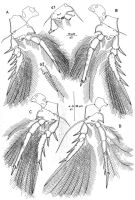 issued from : R. Böttger-Schnack in Mitt. hamb. zool. Mus. Inst., 1999, 96 [p.102, Fig.29]. Female: A, P1 (posterior) [a1, xoxa and 1st segment of endopod and exopod, anterior, showing surface ornamentation; a2, distal part of endop-3, anterior]; B, P2 (anterior); C, P3 (anterior); D, P4 (posterior).]
|
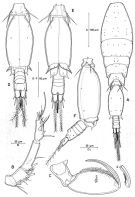 issued from : R. Böttger-Schnack in Mitt. hamb. zool. Mus. Inst., 1999, 96 [p.103, Fig.30]. Male (from Red Sea): A, habitus (dorsal); B, A1; C, Mxp (anterior) [c, proximal part of endopodal claw, showing fused pectinate spine]; D, urosome (dorsal (spermatophores extruding); E, idem (ventral); F, idem (lateral right side). Nota: Proportional lengths (%) of urosomites and caudal rami 6.6:56.4:5.4:5.4:5.1:11.7:9.3. Relative lengths (%) of segments of A1 measured along posterior non-setigerous margin 5.9:20.3:44.9:28.9.
|
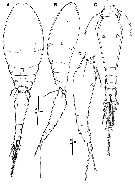 Issued from : K. Cho, W.-S. Kim, R. Böttger-Schnack & W. Lee in J. Nat. Hist., 2013. [p.19, Fig.6]. Female (10°30'N, 131°20'W): A, habitus (dorsal); B, habitus (lateral); C, urosome (dorsal); D, urosome (lateral). Scale bars in µm. Nota : Exoskeleton moderately chitinized, surface covered with numerous small pits. Prosome 1.6 times length of urosome, excluding caudal rami, about 1.5 times urosome length including caudal rami. P2-bearing somite with out dorsoposterior projection in lateral aspect. Integumental pores on prosome as indicated fig.6A, B. Pleural areas of P4-bearing somite with small pointed posterolateral corners. Integumental pores on urosomites (fig.6D) similar to T. pacifica. Genital double-somite about 1.6 times as long as postgenital somites combined, with elongate flask-like form ; largest width measured at anterior third, lateral margins slightly rounded, posterior 2/3 tapering gradually. Dorsal surface paired genital apertures located at about 2/5 of distance from anterior margin and paired secretory pores posterior to genital apertures. Anal somite slightly longer than wide ; 1.5 times longer than caudal rami. Caudal ramus about 1.5 times as long as wide.
|
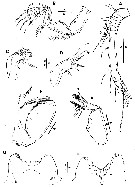 Issued from : K. Cho, W.-S. Kim, R. Böttger-Schnack & W. Lee in J. Nat. Hist., 2013. [p.21, Fig.8]. Female (NE equatorial Pacific): A, A1: B, A2 (posterior); C, Md; D, Mx1; E, Mx2; F, Mxp (anterior), elements on inner margin of basis figured separately, insertion points of elements on basis indicated by stippled line; G, labrum (anterior); H, labrum (posterior). Scale bars in µm. Nota : A1 6-segmented. Armature formula as for T. pacifica. A2 3-segmented, relative lengths (%) of segments 40 : 34 : 26 (similar to T. pacifica). Labrum with 5 to 6 large dentiform processes medially along distal margin of each lobe, processes differing in size and shape. Anterior surface fig. 7G) with spinular patch on either side of median swelling, lacking integumental pockets. Posterior surface (fig.7H) with group of 3 secretory pores on proximal part of each lobe and additional pair on midregion. Md similar to that of T. pacifica, except for dorsal blade with large dentiform processes along half dorsal and entire distal margins. Mx1 similar to T. pacifica, even with respect to minor ornamentation details. Mx2 similar to thart of T. pacifica. Mxp similar to T. pacifica, eccept for spiniform element on basis stout and stronger than in T. pacifica.
|
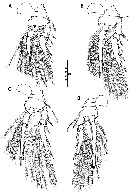 Issued from : K. Cho, W.-S. Kim, R. Böttger-Schnack & W. Lee in J. Nat. Hist., 2013. [p.21, Fig.8]. Female (NE equatorial Pacific): A-D, P1 to P4 (anterior views). Scale bar in µm.
|
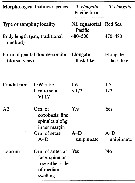 Issued from : K. Cho, W.-S. Kim, R. Böttger-Schnack & W. Lee in J. Nat. Hist., 2013. [p.16, Table 2]. Morphological characters of Triconia elongata of the Triconia dentipes-subgroup from the north-eastern equatorial Pacific. Nota: Orn: ornamentation; L: length; W: width; Compare with related species and form variants of the Triconia dentipes-subgroup from the north-eastern equatorial Pacific and from other regions: T. dentipes, T. pacifica, T. giesbrechti (Pacific form), T. giesbrechti (Red Sea form), T. constricta.
|
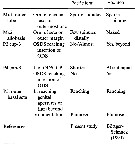 Issued from : K. Cho, W.-S. Kim, R. Böttger-Schnack & W. Lee in J. Nat. Hist., 2013. [p.17, Table 2 (Continued)]. Morphological characters of Triconia elongata of the Triconia dentipes-subgroup from the north-eastern equatorial Pacific. Nota: Orn: ornamentation; L: length; W: width; OSDS: outer subdistal spine; ODS: outer distal spine; CP: distal conical process Compare with related species and form variants of the Triconia dentipes-subgroup from the north-eastern equatorial Pacific and from other regions: T. dentipes, T. pacifica, T. giesbrechti (Pacific form), T. giesbrechti (Red Sea form), T. constricta.
| | | | | Ref. compl.: | | | McKinnon & al., 2008 (p.844: Tab.1); Nishibe & al., 2009 (p.491, Table 1: seasonal abundance); Böttger-Schnack & Schnack, 2009 (p.131, Table 3, 4, Rem.) | | | | NZ: | 5 | | |
|
Carte de distribution de Triconia elongata par zones géographiques
|
| | | | | | | | | | Loc: | | | Medit. (Balearic Basin, Strait of Sicily, Ionian Sea, Lebanon Basin), Red Sea (N-S), Australia (North West Cape), Japan (Tosa Bay), NE tropical Pacific | | | | N: | 6 | | | | Lg.: | | | (810) F: 0,470-0,480; (pers. comm.) F: 0,450-0,510; M: 0,390; (1166) F: 0,544; {F: 0,45-0,544; M: 0,39} | | | | Rem.: | épipélagique.
Voir aussi les remarques en anglais | | | Dernière mise à jour : 02/02/2015 | |
|
|
 Toute utilisation de ce site pour une publication sera mentionnée avec la référence suivante : Toute utilisation de ce site pour une publication sera mentionnée avec la référence suivante :
Razouls C., Desreumaux N., Kouwenberg J. et de Bovée F., 2005-2025. - Biodiversité des Copépodes planctoniques marins (morphologie, répartition géographique et données biologiques). Sorbonne Université, CNRS. Disponible sur http://copepodes.obs-banyuls.fr [Accédé le 26 novembre 2025] © copyright 2005-2025 Sorbonne Université, CNRS
|
|
 |
 |












